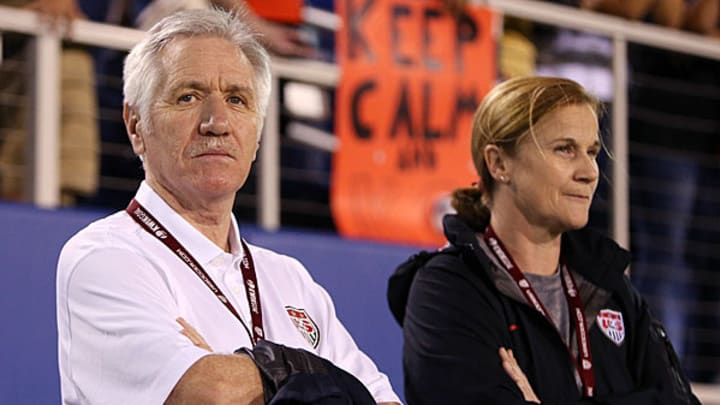Dismissal as U.S. women's coach leaves Tom Sermanni wondering what went wrong

The sudden firing of U.S. women's national team coach Tom Sermanni (left) leaves director of development Jill Ellis in charge on an interim basis. (Andy Mead/YCJ/Icon SMI)
U.S. women’s national team coach Tom Sermanni had no idea he was about to be fired when he walked into a meeting with U.S. Soccer president Sunil Gulati and general secretary Dan Flynn after the U.S.’s 2-0 win against China in Commerce City, Colo., on Sunday.
“I was completely blindsided,” Sermanni told SI.com late Sunday night. “Maybe I’m losing my intuitive and perception skills, but I didn’t sense a real unease in the team. But I could be wrong in that regard.”
No matter you look at it, Sermanni’s firing is a stunner in the world of women’s soccer. The 59-year-old Scotsman, who’d enjoyed years of success coaching Australia, had just taken over the U.S. team in January 2013 after a long and meticulous search process. His objective: Get the U.S. qualified and ready to win World Cup 2015 in Canada.
Sermanni was unbeaten in his first 20 games with the U.S., going 16-0-4, but then came last month’s Algarve Cup in Portugal, which turned into a nightmare. The U.S. lost to Sweden and Denmark, ending a 43-game unbeaten streak and giving up a program-record five goals to the Danes. Even tougher than the Denmark loss may have been losing to the Swedes, who were coached by Pia Sundhage, Sermanni’s predecessor on the U.S. team. The Americans ultimately took seventh place in a tournament they had grown accustomed to winning.
But even then it seemed that a minor tournament like the Algarve Cup wouldn’t be enough reason for Sermanni to think his job was in jeopardy. And he certainly didn’t suspect that was the case.
Then came the meeting with Gulati and Flynn after Sunday’s game. It was the first time Sermanni had spoken to Gulati since the Algarve, and the USSF honchos didn’t waste any time. “To put it in a nutshell, they just felt that the way I was managing the team wasn’t working,” Sermanni said. “It could be the U.S. team is a unique team that has certain demands that perhaps my management style or my philosophy didn’t quite gel with.”
What happened behind the scenes that led to Sermanni’s firing? And was this a case of a powerful group of U.S. players working to push Sermanni out the door? It’s reasonable to think that Gulati spoke to some U.S. players before making his decision. That’s what he did before firing Bob Bradley as the men’s coach in 2011. A source close to several U.S. players told SI.com on Sunday night that Gulati was very concerned about the team following the Algarve Cup and spoke to several players, who were also worried about their direction heading toward the World Cup qualifying tournament in October.
“I would assume obviously there has to be some degree of dissatisfaction among the players, otherwise we wouldn’t have gotten to this point so quickly now,” Sermanni said. “But I don’t know, and that’s life. I can say the players have done what I’ve asked them to do over the last year and a half, and that I have no qualms with them in the sense of having poor relations with them.”
Gulati declined to comment when reached by SI.com, but he will be speaking to the media about his decision in a conference call at 4:30 p.m. ET on Monday.
Coaching the U.S. women’s team is like coaching the Brazilian men’s team. The pressure is great, and even the slightest wobble can turn into something big. Greg Ryan went 45-1-9 as the U.S. coach, but that one loss came in the 2007 World Cup semifinals, and soon he was gone. Ryan, however, was fired just as much for his poor handling of benching goalkeeper Hope Solo for that game. Sermanni went 18-2-4 and didn’t have a management meltdown on a big stage like Ryan did.
U.S. Soccer director of development Jill Ellis will serve as an interim coach, with a search for Sermanni’s replacement starting immediately. Only 14 months remain before the start of World Cup 2015, so whoever comes in will have to work fast.
As for Sermanni, he met briefly to thank the team after Gulati had informed them of the move, and he said a few players had visited him on Sunday night. He now leaves his job wondering where he went wrong. “I’ve been in the coaching game for 25 years now, and this is the first time I haven’t coached until the end of a contract," he said. "So it’s a new experience for me as well.”

A leading soccer journalist and best-selling author, Grant Wahl has been with SI since 1996 and has penned more than three dozen cover stories.